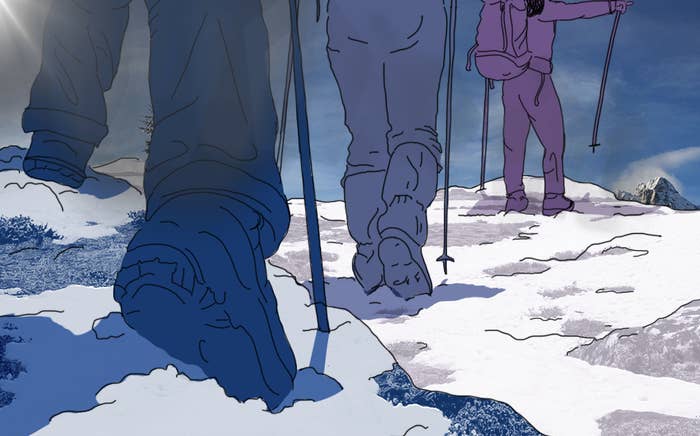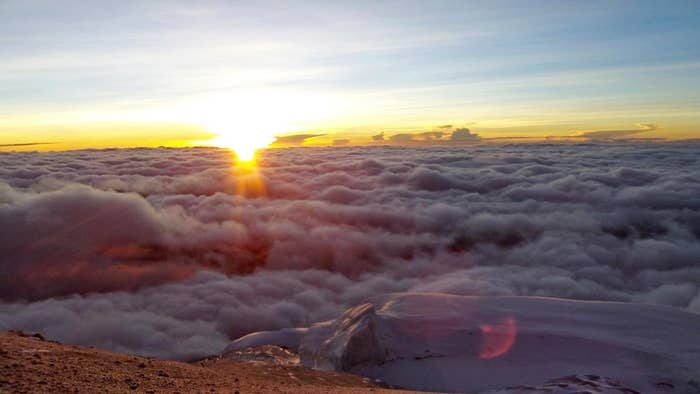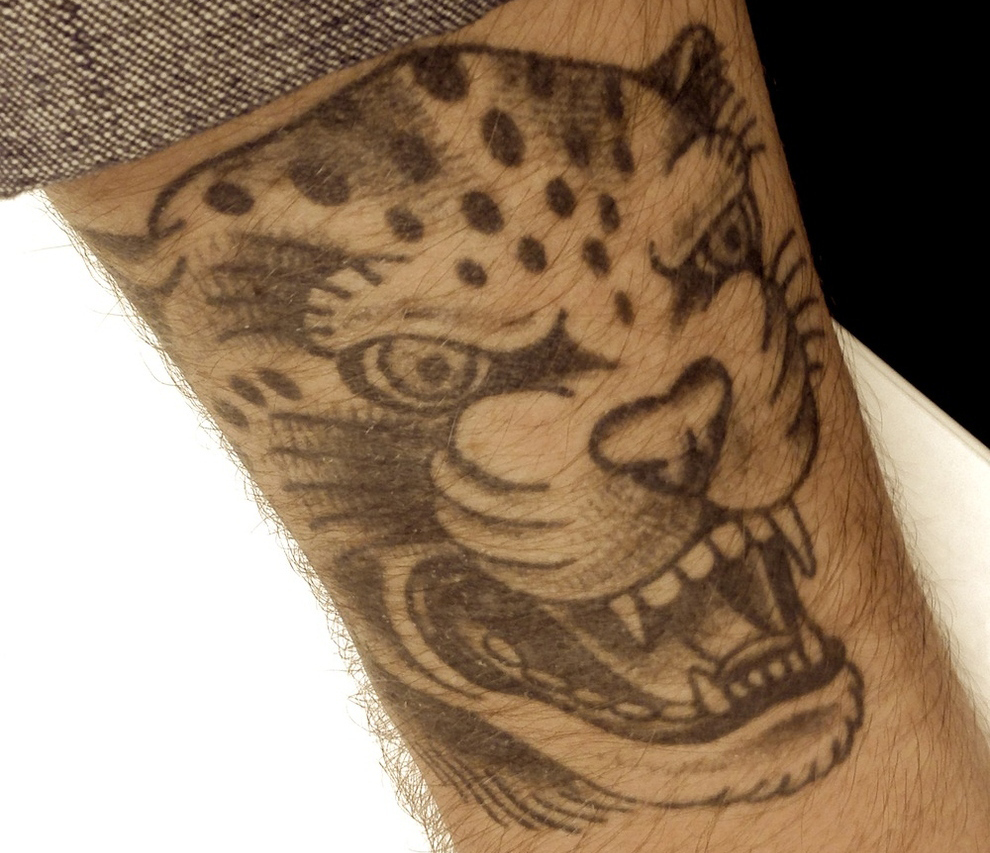
"Polé, polé. Slowly, slowly."
For hours now, my sister, father, and I have been climbing in the darkness. Rock and glacial snow crunch under our boots. Ahead of us our guide shuffles his feet. He stops every 20 yards to turn and shine a flashlight onto my sister. Her face is blue.
We're on day seven of our climb up Mount Kilimanjaro. We had left camp at 10 p.m. the night before, and planned to summit at sunrise on Christmas Day. At first this had seemed entirely possible. My father, old but strong, had showed no signs of fatigue. Nor did I, despite a number of bad habits that had been cautioned against in the guidebook. Do you exercise? No. Do you smoke? Yes. Do you drink? With extreme prejudice.
My sister is a marathon runner, a vegetarian, blonde-haired and blue-eyed, which I know has nothing to do with your health, but still. Yet it was she who had started stumbling back into me every time we came to a large rock, as if she'd been on a weekend bender.
"Maybe we should turn around?" I say.
Our guide stops again and shines his light into my sister's eyes. "Stick out your tongue."
She sticks it out, as she had at me so many times when we were younger.
"No," our guide finally says. "We can keep going. Polé, polé. Slowly, slowly."
So we continue our stumble up the mountain.
***
Christmas on Kilimanjaro is the first holiday I've spent with family in seven years. Since 2006, I had been living in San Francisco — 3,000 miles away from any family gathering. Before that I was in college, and before that I was on scholarship at boarding school. Every summer I spent working. I never went back. The very first time I ran away from home, I was in middle school. I got two towns over on my father's bike before a police officer stopped me on the side of the highway. My parents never found out.
Long before I was out of the house for high school, I would sneak into the woods for cigarettes and make friends with the older kids. They had cars, parties in fields, and drugs that would make everything seem different, if not better. I became a mascot of sorts, the 12-year-old who would try anything you gave him, even if no one else knew what it was. I spent my early teenage years atop shoulders, hoisted upside down over kegs, high as hell and trying to forget.
I have a history with my parents, as any of us who have parents do. The house was loud with yelling when anybody was in it. For a while when I was 8, it was just me and my mother, her scooped out with loneliness and me too young to help in the middle of rural Massachusetts, in a house heated only by one tiny wood-burning stove. We would warm bricks on the hot metal and then put them in bed so the sheets wouldn't shock us with their chill. We often slept in the same bed, my mother's arms wrapped around me as she cried. Me not asking questions and her not answering.
***
My sister's email was short and to the point: "I want to climb Kilimanjaro. You should come. I'll pay."
Whenever it came time to visit family, crying poverty was my favorite excuse. But this wasn't your regular Christmas at home — this would be Christmas on a mountain. With my sister. My half sister, actually, who I hadn't seen much of since we were little, visiting each other occasionally while growing up in separate homes on separate sides of the state. She was making an effort, and I was getting to the age where I could appreciate that.
"Sure," I wrote back, while making a mental note to cut back on my smoking. "Just you and me."
Our family tree isn't so much a tree as a thicket. My parents were married when they had me, but to different people. My sister is my father's daughter, but not my mother's. My brother is my mother's son, but not my father's. Three years after I was born, my parents were forgiven by the Catholic Church and got married to each other, driving away from a small chapel in a beat-up pickup covered in toilet paper and Silly String. Their union — and my birth — had robbed my half sister of her father and my half brother of his mother. It also granted me half siblings whom I loved wholly, even if we didn't see each other as much as we should have.
Just weeks before we were supposed to fly out from NYC, my sister called me up. She told me, "Dad wants to come."
"If you want, I could tell him this is our trip," I said. "That it's about us bonding. I'm not afraid to ask him not to come."
"Why would I want that?" she said.
"Oh. Right." Turned out I was the one who was afraid to have our dad come along. Suddenly I was 8 years old again, trying to block out the noise.
***
"We can switch places, if you want." My father kept offering to walk behind her, to catch my sister if she fell backward, and I kept saying I was fine. She was suffering from altitude sickness. Blurred vision. Dizziness. A headache. She was dehydrated no matter how much water she drank.
I could feel that my father was worried. He always worried about us when we were sick. I was worried too. But underneath that worry we both wanted the same thing: to get up the mountain. Underneath her sickness my sister was no different; she just wanted to get to the top.
***
Once my dad got into the holiday plan mix, my mom started getting feisty. "Well, you're already coming east to fly out with your sister and your father," she said. "I just don't understand why you can't come a little earlier for Thanksgiving."
"Ma, I told you. A college friend is getting married in Baltimore that weekend. It's an Indian wedding. Lasts three days."
Thank god for holiday weddings. Any family but your own. I didn't have to think about Kilimanjaro, and I tried not to. After three days of celebrating, dancing the Dandiya Raas, and doing my damnedest not to seem too drunk despite leaving the hours-long ceremony to sneak shots with hotel workers, a good friend of mine who spent his entire college career in the closet and was making up for lost time in a major way turned to me and said, "Want to go to a club?"
His date, whom I barely knew, chimed in. "We found a local place advertised on Grindr. Down Low After-Hours Gay Hip-Hop. Downtown Baltimore." And, then, inevitably: "Here, take these!"
The first pills took hold before we got there, otherwise we might have just turned around and left. Inside, the club was unpromising and sparse. A few men circled each other on the dance floor. Most huddled close to the bar, which sold giant cups of vodka for $7 a pop.
"Happy holidays," the bartender said to me as I ordered my third.
Soon, the pills that we promised ourselves we would slowly take over the course of the night were gone and we bounced together on the dance floor, attracting a crowd so thick that I couldn't tell if it was my friend playfully smacking my ass or a stranger with other intentions. Either way, I didn't care.
Since moving to San Francisco, I'd spent every Thanksgiving and Christmas in bars, having heart-to-hearts with strangers who would eventually become friends, friends who would eventually become family. This is how I was most comfortable, drunk and far from home on the holidays. Always happy to talk with people I didn't know.
"Be careful who sees you leaving here." The bouncer opened the door as my friend, his wedding date, and their two new friends spilled into the street. The cab had already been hailed.
"Come with us!" they chorused, but I waved goodbye as they got into the purple and white car.
"Hey! You shouldn't walk," the bouncer shouted after me, but I was already off, striding down the street in the direction of my hotel. I've always been good at walking, finding my way around. Putting one foot in front of the other.
***
"Polé, polé. Slowly, slowly."
The sun breaks on the glaciers as we walk toward Uhuru Peak, the highest point on Mount Kilimanjaro. My sister is held up by the guide, but she seems to be improving. Still, we rest every few yards. Japanese tourists briskly walk past us, their hiking poles chipping away at the ice.
Behind me is Foza, a guide who had been with us since he picked us up from the airport. Foza is skinny the way runway models want to be, his biceps the same size as his forearms.
"See," says Foza, "I told you we'd make it." He points at my father. "Babu is strong, and your sister, she is all right."
I look ahead as tourists crowd around the green sign erected by the government of Tanzania, written only in English:
"Congratulations! You are now at Uhuru Peak, Tanzania, 5,895 m. AMSL. Africa's Highest Point. World's Highest Free-Standing Mountain."
We stand on top of an entire continent. Cameras which no longer click capture smiling faces and a sky that goes on forever. Someone offers my sister tea from a thermos.
"What do we do now?" I ask Foza.
He grins, probably because he's been asked the question so many times before. "Now we go back down."
It took us seven days to climb to the summit of Mount Kilimanjaro. It will take us two to return to its base.

"Maybe we'll get together again next year," my sister says before we part ways back in NYC. "The whole family."
My father and I had shared a tent on our trip up Kilimanjaro. He farted, and pissed in bottles, and we read books and sat in silence. There was no great conversation. I didn't forgive him, and he didn't ask to be forgiven. We just walked up a mountain together. One foot in front of the other. Either me looking at his back or he looking at mine. He was a different man and I was a different boy. Polé, polé, slowly, slowly.
Not next year, I think, but maybe soon.
I hug my sister goodbye and immediately go to a tattoo parlor. After that, I spend the next 10 hours before my flight out of town at a bar in Red Hook, Brooklyn. After the bar closes for the night, I get to the airport four hours early, but still almost miss my plane out of New York. Being at the airport on time doesn't guarantee that you'll actually make it onto your flight, if you pass out in front of the gate.
"Are you Isaac Fitzgerald?" says the airline employee who, after calling my name multiple times over the intercom, is kind enough to come over and kick me awake. "Hurry up. Doors are closing. Hurry, hurry!"
Last year my brother and his wife announced that they were pregnant. I was on the West Coast and wasn't there in person to share their joy. Nor was I there to share their pain when they lost the baby. The 3,000 miles between coasts had gone from a distance that allowed for me to become my own person, away from the shadow of our family history, to a distance that kept me from being part of the family we were becoming. We had all changed. Life had gone on long enough for us to try getting things right. I didn't need to be the guy who drank tequila in the mornings and never saw his parents, never really acted like he had a family. For the first time in years, my heart felt pulled toward the Atlantic instead of the Pacific. My sister knew it before I did.
Three months ago my brother texted me one word. "Heartbeat." Three weeks ago I moved to the East Coast.
Today will be my first Christmas with my family, my full family, in seven years. Seven days up. Two days down.
***
On the Serengeti, days before we climb the mountain, my father, my sister, and I stare up into a tree. "Be patient," Foza says. "It has its dinner. The leopards take their kill into the tree. Their spots help them hide. How do you say? Camouflage." Foza speaks 10 languages. Sometimes he mixes them up. He is a father himself. "Sons are hard," he'd said one day, almost at random.
"Look in the tree," says Foza. "Can you see the leopard?" I am in a truck with my father and my sister in the middle of the Serengeti. We stare up at the tree, the Tanzanian sunlight shining through the large, sparse leaves. Nothing moves. Our necks arch, and our eyes search. "Just be patient," Foza says. "You'll see it."
"Look," Foza says. We stare at the tree, knowing there is a leopard but seeing nothing. There is a rustle. And then the bones fall from the branches.

